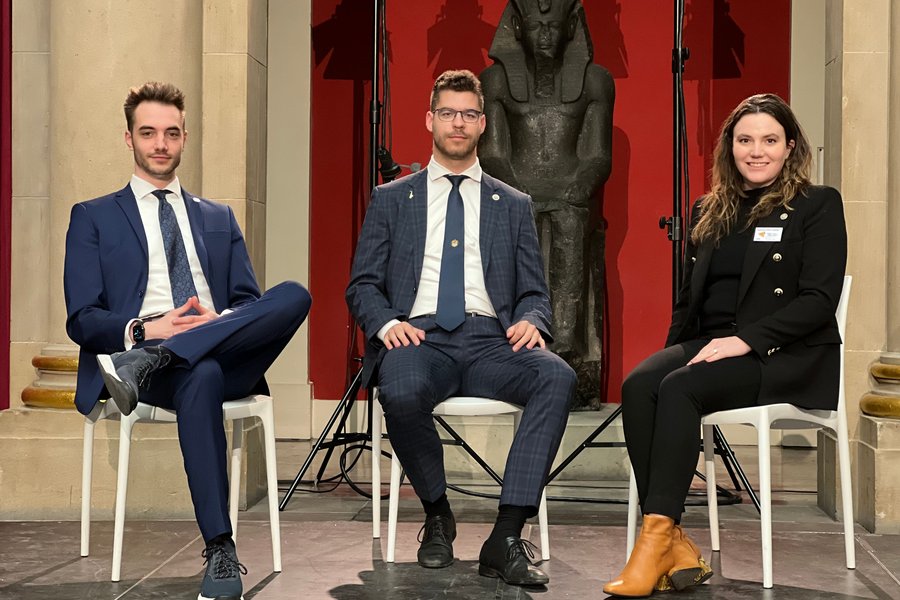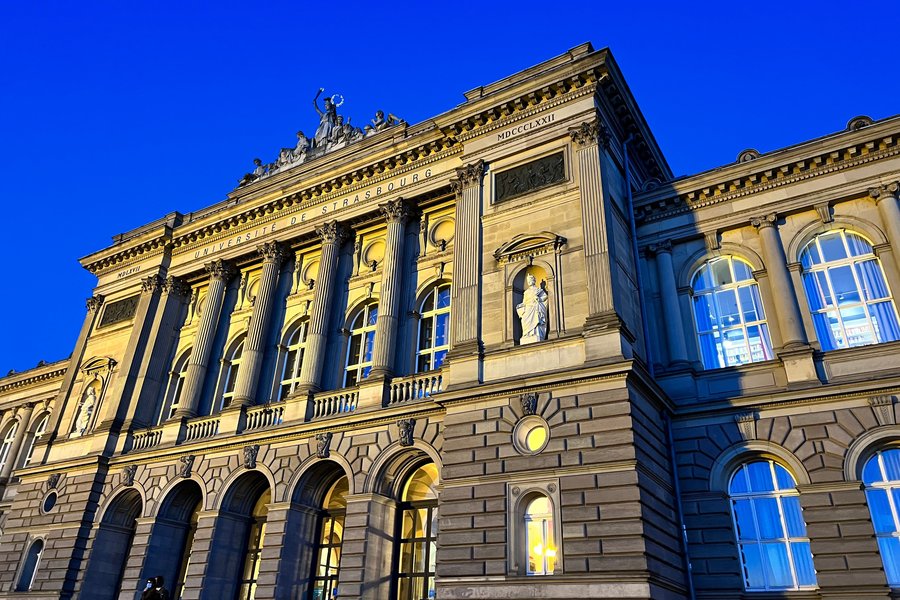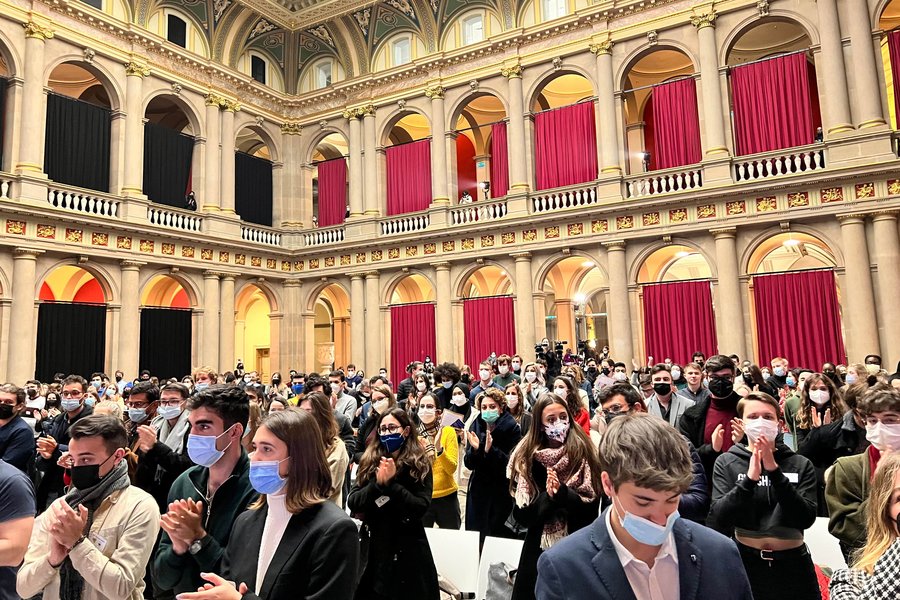Report on the first session of the European Student Assembly
In late 2021, more than 800 students across Europe applied to take part in the inaugural session of the European Student Assembly (ESA). In March 2022, following a rigorous application process, 275 students from across Europe gathered together in Strasbourg, the permanent seat of the European Parliament, to mark the ESA. The aims of the conference included fostering collaboration across European University Alliances, as well as enabling students to feel their voices were heard in the Conference on the Future of Europe via the creation and presentation of recommendations.
EUniWell was one of the 38 alliances invited to attend the ESA. Amel Anane (former EUniWell Chief Student Officer and Chair of the Birmingham Board), Sloan Kudrinko (EUniWell Student Board Executive Member, Semmelweis), Félix Takács (Member of the EUniWell Student Board and Vice-President of the Students’ Union, Semmelweis) and Bálint Tripolszky (President of the Students’ Union, Semmelweis) were honoured to represent EUniWell at the ESA. Prior to the conference taking place, students were split into ten panels, each focussing on areas including climate change, cyber security, the economy and health.
The topics of the panel sessions are outlined below:
- How can the EU reunite its people around its common values?
- How can the European Union become more resilient to cyber attacks?
- Learning from the pandemic - Do we need a European Health Union?
- Agriculture vs. Sustainability - What CAP for the future?
- Sustainable development or degrowth - What economic model can the EU adopt for tomorrow’s world and how can it be durably settled?
- Re-thinking democratic engagement in the digital age: How should the European democracy of tomorrow look like?
- Social media: opportunities and threats - How can the EU regulate digital platforms without limiting freedom of speech and free exchange of thoughts?
- How should the EU position itself in a globalised world, vis-à-vis other actors such as the US, China, or Russia, and with regard to conflicts in its neighbourhood?
- Climate refugees as a new challenge for Europe - How should the European Union prepare to deal with refugee crises to come?
- Online is good, in person is better!? How to build future-oriented, digitalized, and yet inclusive higher education systems across the European Union
In the two months leading up to the ESA, each panel scheduled a minimum of two meetings to discuss and engage with an expert in their panel’s topic. These sessions were crucial to the success of the ESA because they allowed the students to ask questions, learn different opinions and listen to an in-depth discussion with an expert in their field. Amel Anane, having a background in health economics and languages, took part in the Foreign Policy panel. Sloan Kudrinko, Félix Takács and Bálint Tripolszky were part of the Health panel as they are students of dentistry and medicine at Semmelweis University. The aim of each panel was to produce ten Policy Proposals which answer the panel’s key question. These proposals were collected and will be submitted to the Conference on the Future of Europe.
On the first day of the ESA, attendees met at the European Parliament where we learnt about the structure of the organisation and how MEPs engaged with one another through committees and political parties within the parliament.
As a member of the Foreign Policy panel, Amel was given the opportunity to discuss and delve into the EU’s relations with Russia, China, South West Asia and North Africa, as well as the EU’s relationship with its neighbourhood. Students were privileged to learn from Professor Earl Wang of Sciences-Po on EU-US and EU-China relations, the strategic autonomy of the EU, how the EU should position itself in US-China competition and the EU’s role in the Indo-Pacific region. Marie Dumoulin, Director of the Wider Europe programme at the European Council of Foreign Relations (ECFR) delivered an informative and engaging presentation on EU-Russia and EU-Eastern neighbourhood relations. Students worked in smaller subgroups to devise recommendations regarding EU voting procedures and crisis negotiation.
As Sloan, Félix and Balint took part in the Health panel, they were able to discuss a multitude of ideas to better the health care system across Europe, which included the main question: Do we need a European Health Union? During the meetings prior to the conference, the health panel met with Dr. Mihály Kökény. Dr. Kökény is a Health Policy Consultant and a lecturer in health policies at the University of Debrecen, Hungary. During these meetings we discussed issues including national sovereignty, developing a unified approach to common struggles and that health has not been a key priority until recent events. These fruitful discussions enabled the health panel to come together at the ESA to create ten proposals. These proposals were based on the following ideas: digital health, health policies/regulations, sovereignty vs solidarity, the link between academic research and healthcare, healthcare workers, costs of healthcare between countries, cross border healthcare, mental health and climate change & One Health.
During the plenary meeting the results of our panels’ discussions were presented to the entire assembly. Attendees voted in favour of proposals designed by students for the future of Europe. At the conference, we heard from a number of MEPs, presidents of student bodies across Europe, and gained a better understanding and appreciation of the European higher education system.
The ESA was a rewarding experience that allowed us to promote the EUniWell values of diversity, inclusion and well-being and network with students from over thirty European Universities. It is our hope that many more students from across EUniWell will become involved with the conference in the future.
Download the report here.
Contact:
If you are a student and want to participate in EUniWell, do not hesitate to contact the Student Board: student_officers[at]euniwell.eu
Stay in touch & up-to-date!
Follow us on our social media channels:
Twitter
LinkedIn
Instagram
Facebook
And subscribe to our EUniWell newsletter for regular highlights and save-the-dates to upcoming EUniWell events delivered straight to your inbox:



